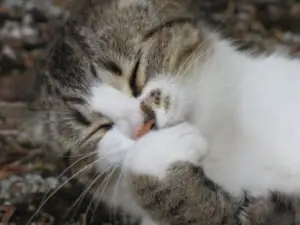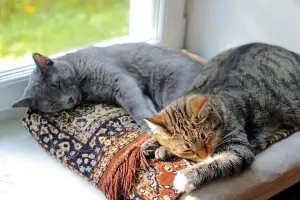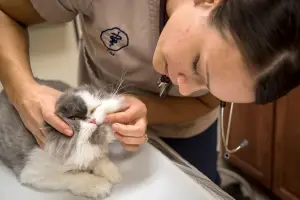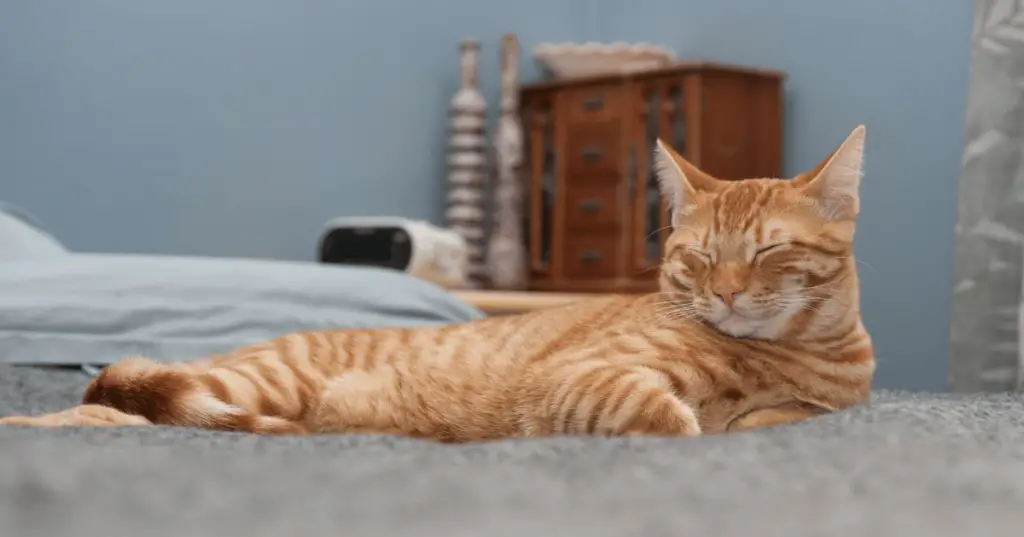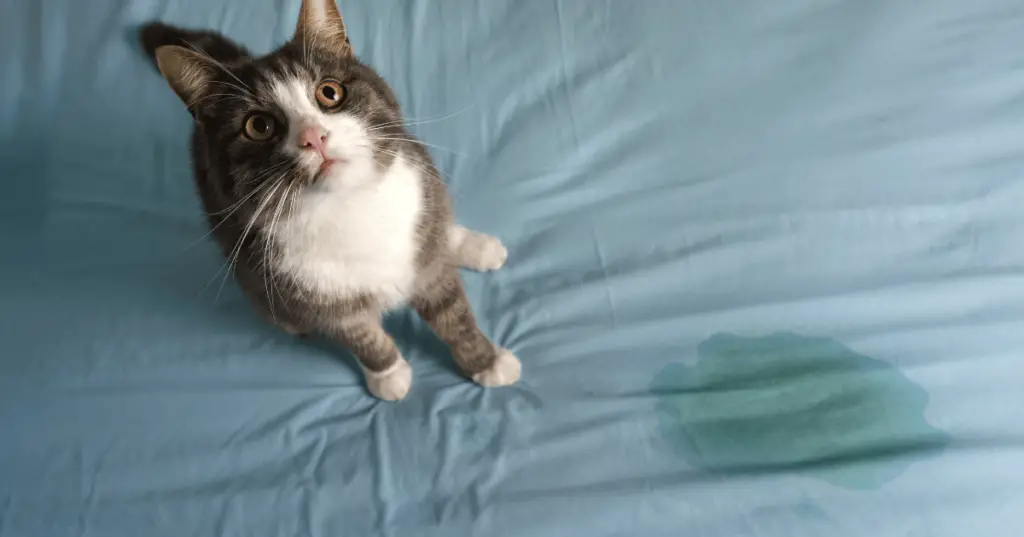The Hidden Meanings Behind Your Cat’s Blanket-Licking Habit
Understanding our feline friends’ behaviors can sometimes feel like decoding a complex puzzle. One such behavior that often leaves cat owners scratching their heads is the seemingly peculiar habit of blanket licking. In this article, we’ll delve into the depths of this behavior, uncovering its hidden meanings and shedding light on why cats engage in this intriguing activity.
Why Do Cats Lick Blankets?
Instinctual Behavior
At the core of a cat’s nature lies its instinctual grooming behavior. Cats are meticulous groomers, spending a significant portion of their day licking themselves to keep their fur clean and free of debris. When they extend this behavior to blankets, they might perceive the fabric as an extension of themselves, aiming to maintain its cleanliness and remove any unfamiliar scents.
Comfort and Security
Blanket licking can also be attributed to a cat’s innate desire for comfort and security. Cats are creatures of habit, seeking out soft, cozy spots to curl up and relax. A blanket, with its plush texture and familiar scent, provides the perfect retreat for a cat seeking solace. By licking the blanket, they may be engaging in a self-soothing behavior, reminiscent of the comfort they experience while nursing as kittens.
Marking Territory
In the intricate world of feline communication, scent plays a crucial role. Cats have scent glands located in various parts of their bodies, including their tongues. When a cat licks a blanket, they leave behind traces of their scent, effectively marking the territory as their own. This behavior serves as a subtle yet significant way for cats to assert their ownership over their surroundings.
Signs of Comfort-Seeking Behavior
Body Language Cues
Observing your cat’s body language while they engage in blanket licking can provide valuable insights into their emotional state. A content and relaxed cat will exhibit half-closed eyes, a gently swaying tail, and perhaps even a relaxed posture with limbs loosely stretched out. These cues indicate that the cat is in a state of tranquility, finding comfort in the act of licking the blanket.
Purring and Kneading
Accompanying the blanket licking, you may notice additional behaviors such as purring and kneading. Purring is a well-known sign of feline contentment, indicating that the cat is experiencing pleasure and relaxation. Kneading, where the cat rhythmically presses its paws into the fabric, is a leftover behavior from kitten hood when they kneaded their mother’s belly to stimulate milk flow. Both of these behaviors further reinforce the notion that the cat is engaging in comfort-seeking behavior.
Decoding Cat Purring and Blanket Licking as a Trust Indicator
Licking as a Self-Soothing Mechanism During Stress
Cats are sensitive beings, and they can show stress in different ways. If your cat starts licking blankets a lot, it could be a sign of anxiety. Maybe you’ve brought a new pet home, moved, or changed things around the house. These changes can stress out your cat, leading to behaviors like excessive grooming or blanket licking. It’s important to figure out what’s bothering your cat and make things better for them. This helps keep your furry friend happy and healthy.
Identifying and Alleviating Anxiety in Your Cat
Pay attention to your cat’s body language and behavior for signs of stress or anxiety. Common indicators include hiding, decreased appetite, excessive grooming, and changes in litter box habits. Providing a safe and predictable environment, along with plenty of enrichment and mental stimulation, can help alleviate your cat’s anxiety and reduce their reliance on blanket licking as a coping mechanism.
Health Considerations
Obsessive Behavior
While occasional blanket licking is typically harmless, excessive or obsessive licking could signal an underlying health issue or behavioral problem. Cats have routines they stick to, so any abrupt shifts in their behavior warrant closer examination. If your cat displays obsessive blanket licking to the exclusion of other activities, it’s advisable to consult with a veterinarian to rule out any potential health concerns.
Dental Issues
Blanket licking might signal underlying dental issues, such as toothache or gum disease. Cats often turn to soft materials like blankets to ease mouth discomfort. If you notice your cat licking blankets along with other symptoms like drooling, pawing at the mouth, or avoiding hard food, it’s crucial to schedule a vet visit promptly. This ensures any potential dental issues are addressed promptly and effectively.
Stress and Anxiety
Cats are sensitive creatures, easily affected by changes in their environment or routine. Stress and anxiety can manifest in various ways in cats, including excessive grooming or blanket licking. If you’ve recently introduced a new pet into the household, moved to a new home, or made significant changes to your cat’s environment, they may turn to blanket licking as a coping mechanism. Identifying and addressing the underlying cause of stress is essential for ensuring your cat’s well-being.
Addressing Blanket-Licking Behavior
Providing Alternative Comforts
To discourage blanket licking, it’s essential to understand cat behavior. Provide your cat with alternative comforts like a cozy cat bed, a soft fleece blanket, or a designated relaxation spot. By offering these alternatives, you can redirect their attention away from your blankets while still fulfilling their need for warmth and security. This helps address their comfort-seeking behavior positively.
Consulting a Veterinarian
If you’re concerned about your cat’s blanket licking behavior, don’t hesitate to seek advice from your veterinarian. They can conduct a thorough examination to rule out any underlying health issues and provide guidance on how to address behavioral problems effectively. Your veterinarian may recommend behavioral modification techniques, dietary changes, or even medication to help alleviate your cat’s stress and anxiety.
Reducing Stressors
Take proactive steps to minimize stressors in your cat’s environment, thereby reducing the likelihood of blanket licking as a coping mechanism. Maintain a consistent routine, provide plenty of opportunities for play and exercise, and create safe spaces where your cat can retreat when they require a break from stimulation. By creating a calm and stable environment for your cat, you can help promote their overall well-being and reduce their reliance on blanket licking as a means of coping with stress.
Conclusion
In conclusion, the seemingly innocuous habit of blanket licking in cats can reveal a wealth of insights into their emotional state and well-being. Whether it’s a comforting gesture, a territorial display, or a coping mechanism for stress and anxiety, understanding the hidden meanings behind this behavior is key to ensuring that our feline companions lead happy, fulfilling lives. By providing alternative comforts, seeking veterinary guidance when needed, and addressing underlying stressors, we can help our cats thrive and flourish in their homes.


